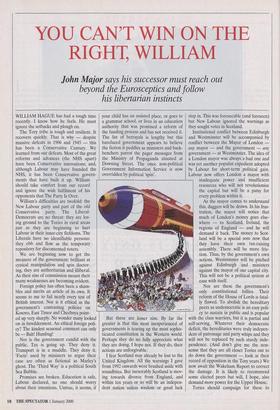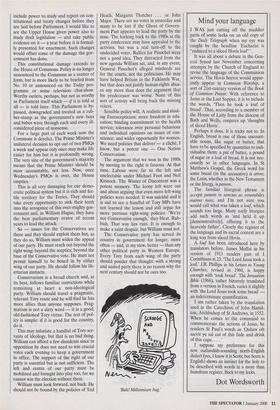YOU CAN'T WIN ON THE RIGHT, WILLIAM
John Major says his successor must reach out
beyond the Eurosceptics and follow his libertarian instincts
WILLIAM HAGUE has had a tough time recently. I know how he feels. He must ignore the setbacks and plough on.
The Tory tribe is tough and resilient. It recovers quickly. That is why — despite massive defeats in 1906 and 1945 — this has been a Conservative Century. We learned from our defeats. Most of the great reforms and advances (the NHS apart) have been Conservative innovations; and, although Labour may have founded the NHS, it has been Conservative govern- ments that have built it up. William should take comfort from our record and ignore the wish fulfilment of his opponents that The Party Is Over.
William's difficulties are twofold: the New Labour party and part of the old Conservative party. The Liberal- Democrats are no threat: they are los- ing ground to the Tories in rural areas just as they are beginning to hurt Labour in their inner-city fiefdoms. The Liberals have no identifiable persona: they ebb and flow as the temporary repository for discontented voters.
We are beginning now to get the measure of the government: brilliant at cynical manipulation and spin doctor- ing, they are authoritarian and illiberal. As their sins of commission mount their many weaknesses are becoming evident.
Foreign policy has often been a sham- bles and merits an article of its own. It seems to me to fail nearly every test of British interest. Nor is it ethical as the government's contrasting policies on Kosovo, East Timor and Chechnya point- ed up very sharply. No wonder many looked on in bewilderment. An ethical foreign poli- cy? The kindest seasonal comment can only be — Bah! Humbug!
Nor is the government candid with the public. Tax is going up. They deny it. Transport is in a muddle. They deny it. `Facts' used by ministers to argue their case are often as fictional as Marley's ghost. The 'Third Way' is a political South Sea Bubble.
Promises are broken. Education is safe, Labour declared, no one should worry about their intentions. Untrue, it seems, if your child has an assisted place, or goes to a grammar school, or lives in an education authority that was promised a reform of the funding process and has not received it. The list of betrayals is lengthy but this barefaced government appears to believe the fiction it peddles as ministers and back- benchers parrot the pager messages from the Ministry of Propaganda situated at Downing Street. The once non-political Government Information Service is now overridden by political 'spin'.
But these are lesser sins. By far the greater is that this most inexperienced of governments is tearing up the most sophis- ticated constitution in the Western world. Perhaps they do no fully appreciate what they are doing. I hope not. If they do, their actions are unforgivable.
I fear Scotland may already be lost to the United Kingdom. All the warnings I gave from 1992 onwards were brushed aside with soundbites. But inexorably Scotland is mov- ing towards divorce from England, and within ten years or so will be an indepen- dent nation unless wisdom or good luck step in. This was foreseeable (and foreseen) but New Labour ignored the warnings as they sought votes in Scotland.
Institutional conflict between Edinburgh and Westminster will be accompanied by conflict between the Mayor of London any mayor — and the government — any government — at Westminster. The idea of a London mayor was always a bad one and was yet another populist expedient adopted by Labour for short-term political gain. Labour now offers London a mayor with inadequate power and insufficient resources who will not revolutionise the capital but will be a patsy for every problem within it.
As the mayor comes to understand this, daggers will be drawn. In his frus- tration, the mayor will notice that much of London's money goes else- where — to Scotland, Ireland, the regions of England — and he will demand it back. The money to Scot- land will be a special sore now that they have their own tax-raising assembly. There will be more fric- tion. Thus, by the government's own actions, Westminster will be pitched against Edinburgh and ministers against the mayor of our capital city. This will not be a political system at ease with itself.
Nor are these the government's only constitutional follies. Their reform of the House of Lords is fatal- ly flawed. To abolish the hereditary peers as undemocratic is an easy poli- cy to sustain in public and is popular with the class warriors, but it is partial and self-serving. Whatever their democratic deficit, the hereditaries were truly indepen- dent of patronage and party whips and they will not be replaced by such sturdy inde- pendence. (And don't give me the non- sense that they are all closet Tories out to do down the government — look at their record of opposition in the Tory years.) We now await the Wakeham Report to correct the damage. It is likely to recommend some elected peers but will, I hope, also demand more power for the Upper House.
Tories should campaign for these to include power to study and report on con- stitutional and treaty changes before they are laid before Parliament. I would like to see the Upper House given power also to study draft legislation — and take public evidence on it — a year before it is formal- ly presented for enactment. Such changes would offset some of the damage the gov- ernment has done.
This constitutional damage extends to the House of Commons. Policy is no longer announced to the Commons as a matter of form, but is more likely to be briefed from No. 10 or announced on the Today pro- gramme or some television chat-show. Worthy outlets, perhaps, but not as worthy as Parliament itself which — if it is told at all — is told later. This Parliament is by- passed, downgraded and treated as a rub- ber-stamp as the government's new boys and babes wave through each and every ill- considered piece of nonsense. For a large part of each week now the Commons is derelict. The Prime Minister's unilateral decision to opt out of two PMQs a week and appear only once may make life easier for him but it is profoundly wrong. The very size of the government's majority means that the Prime Minister should be more accountable, not less. Now, once Wednesday's PMQs is over, the House empties. This is all very damaging for our demo- cratic political system but it is rich and fer- tile territory for the Tories. They should take every opportunity to sink their teeth into the arrogance of this over-mighty gov- ernment and, in William Hague, they have the best parliamentary orator of recent years to lead the attack. So — issues for the Conservatives are there and they should exploit them but, as they do so, William must widen the appeal of our party. He must reach out beyond the right wing; beyond the sceptics; beyond the base of the Conservative vote. He must not permit himself to be boxed in by either wing of our party. He should follow his lib- ertarian instincts.
Conservatism is a broad church and, at its best, follows familiar convictions while remaining at heart a non-ideological party. William should travel a pragmatic, tolerant Tory route and he will find he has more allies than anyone supposes. Prag- matism is not a dirty word — it is a good, old-fashioned Tory virtue. The test of pol- icy is simple: if it is good for the country, do it.
This may infuriate a handful of Tory ser- vants of ideology, but that is no bad thing. William can afford a few dissidents since in opposition he does not need to win crucial votes each evening to keep a government in office. The support of the right of our party is essential but is not sufficient. The left and centre of our party must be mobilised and brought into play too, for we cannot win the election without them.
William must look forward, not back. He should not be bound by the policies of Ted Heath, Margaret Thatcher . . . or John Major. There are no votes in yesterday and many to be lost if the Ghost of Govern- ment Past appears to lead the party by the nose. The harking back to the 1980s at the party conference may have appealed to the activists, but was a real turn-off to the undecided voter. Rallies for Pinochet were not a good idea. They distracted from the new agenda William set, and, in any event, General Pinochet's alleged misdeeds are for the courts, not the politicians. He may have helped Britain in the Falklands War, but that does not justify human-rights abus- es any more than does the argument that his predecessor was worse. None of this sort of activity will bring back the missing voters.
Sensible policy will. A realistic and think- ing Euroscepticism; more freedom in edu- cation; binding commitment to the health service; tolerance over personal behaviour and individual opinions on issues of con- science; and wider opportunity for women. We need policies that deliver — a cliché, I know, but a potent one — One Nation Conservatism.
The argument that we won in the 1980s by moving to the right is fatuous. At that time, Labour were far to the left and unelectable under Michael Foot and Neil Kinnock. The Winter of Discontent was a potent memory. The loony left were out and about arguing that even more left-wing policies were needed. It was suicidal and it is sad to see a handful of Tory MPs have not learned the lesson and still argue for more partisan right-wing policies. 'We're not Conservative enough,' they bleat. Rub- bish. That way lies ruin. It is enough to make a saint despair, but William must not.
The Conservative party has served its country in government for longer, more often — and, in my view, better — than any other political party in Western Europe. Every Tory from each wing of the party should ponder that thought: with a strong and united party there is no reason why the next century should not be ours too.
Bah! Millennium bug.'



















































 Previous page
Previous page